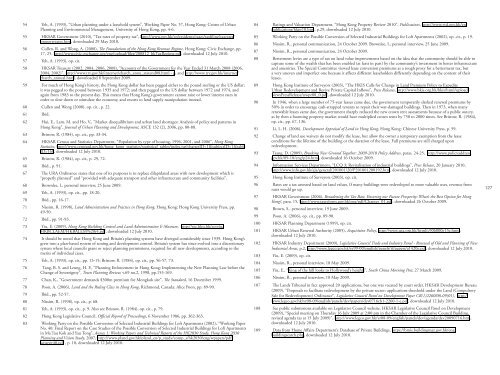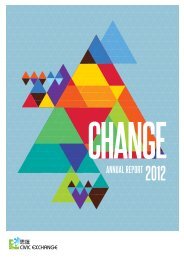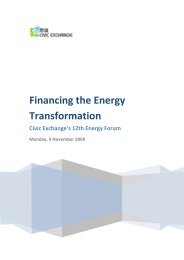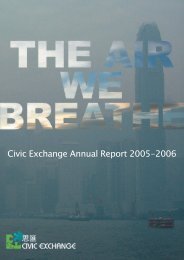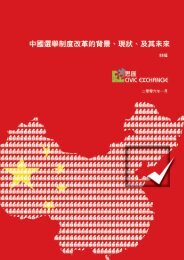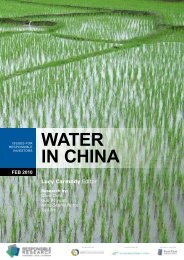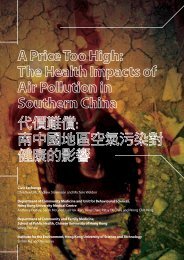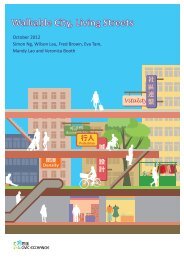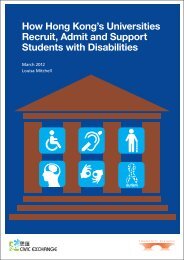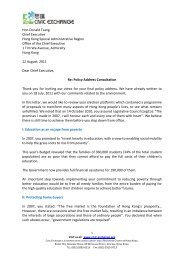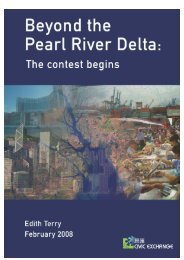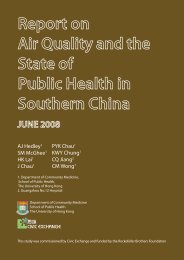126Endnotes1 HKSAR Planning Department (1999), Urban Renewal Strategy Study: Executive Summary, http://www.pland.gov.hk/p_study/comp_s/urss/urss_e.htm, downloaded 14 May 2009.2 Brundtland, G. (ed.)(1987), Our Common Future: The World Commission on Environment and Development, Oxford:Oxford University Press.3 United Nations General Assembly (2005), 2005 World Summit Outcome, http://www.who.int/hiv/universalaccess2010/worldsummit.pdf, downloaded 12 July 2010.4 HKSAR Census and Statistics Department, Table: Population by Sex, http://www.censtatd.gov.hk/hong_kong_statistics/statistical_tables/index.jsp?htmlTableID=139&excelID=&chartID=&tableID=001, downloaded 3 June 2009.5 “Memorandum by <strong>the</strong> Director <strong>of</strong> Public Works”, 12 March 1953, quoted in Bristow, R. (1984), Land Use Planning inHong Kong: History, Policies and Procedures, Oxford: Oxford University Press, p.74..6 DeGolyer, M. E. (2008), Hong Kong’s Silent Epidemic: Public Opinion Survey on Air Pollution, Environment and PublicHealth 2008, Hong Kong: <strong>Civic</strong> <strong>Exchange</strong>, p. 20.7 Ibid., pp. 26-27.8 Leo Ou-fan Lee (2008), City Between Worlds: My Hong Kong, Harvard University Press, p. 250.9 Yeung, R., “The Emergence <strong>of</strong> New Media in Hong Kong Politics”, Hong Kong Journal, Issue 8, October 2007, http://www.hkjournal.org/PDF/2007_winter/2.pdf, downloaded 22 July 2009.10 Tong lau were a common type <strong>of</strong> terraced shop-house in <strong>the</strong> pre-war period, built in a distinctive hybrid Chinese-European style. They were three to five storeys tall, narrow and deep, and usually had balconies supported on pillarsprojecting over <strong>the</strong> pavement. Most were redeveloped into taller buildings during <strong>the</strong> post-war period, and now remainonly in isolated pockets.11 Lee (2008), op. cit., p. 214.12 Hong Kong Legislative Council, Official Repord <strong>of</strong> Proceedings, 28 November 1985, p. 256.13 Tsang, S. W., “A cure for our eyesores”, South China Morning Post, 28 October 1987.14 Pong, Y. Y., personal interview, 21 July 2009.15 Pong, Y.Y., personal interview, 21 July 2009.16 Mu, F. Y. et al., “Dynamic monitoring <strong>of</strong> <strong>the</strong> built-up area expansion <strong>of</strong> Hong Kong based on remote sensing and <strong>the</strong>driving mechanism analysis”, International Society for Optical Engineering Conference Proceedings, Vol. 6418, 54181E,2006, http://dx.doi.org/10.1117/12.712956, downloaded 27 May 2009.17 HKSAR Government (2008), “Hong Kong: The Facts – Population”, Hong Kong Fact Sheets, http://www.gov.hk/en/about/abouthk/factsheets/docs/population.pdf, downloaded 12 July 2010.18 Anon, “The choke’s on us,” South China Morning Post, 25 May 2006.19 Hong Kong Tourism Board, “Nature Tours”, Touring, http://discoverhongkong.com/eng/local-tours/outdoor.html,downloaded 1 June 2009.20 Hong Kong Alternatives, Why an Urban Green Park?, http://www.hkalternatives.com/Eng/proposal2.html, downloaded1 June 2009.21 Singapore Urban Redevelopment Authority (2000), Deliberating <strong>the</strong> Dilemmas, http://www.ura.gov.sg/skyline/2000/05_Sep_Oct/deliberating_<strong>the</strong>_dilemmas_pdf.pdf, downloaded 1 June 2009.22 University <strong>of</strong> Hong Kong Public Opinion Programme, (21 January 2006), Planning for West Kowloon and <strong>the</strong> HarbourFront, p.2, http://www.hkalternatives.com/Eng/downloads/Presentations/HKU-POP-Survey-Results-2006-0124-English.pdf, downloaded 12 July 2010.23 Smith, Peter Cookson (2006), The Urban Design <strong>of</strong> Impermanence: Streets, Places and Spaces in Hong Kong, Hong Kong:MCM Creations, p. 10.24 Character streets have a concentration <strong>of</strong> shops specializing in one type <strong>of</strong> good or service, such as “Sneaker Street” andFlower Market Road in Mong Kok.25 Gorer, P. et al. (2008), “‘Green’ House or Greenhouse? - Climate Change and <strong>the</strong> Building Stock <strong>of</strong> Hong Kong andMacau”, Hong Kong: <strong>Civic</strong> <strong>Exchange</strong>, p.11.26 Ibid., p. 14.27 Ibid., pp. 15-16.28 HKSAR Planning Department (2002), Urban Design Guidelines for Hong Kong: Executive Summary, http://www.pland.gov.hk/p_study/comp_s/udg/udg_es/dig_eng/urban_cover.htm, downloaded 8 June 2009.29 HKSAR Planning Department (2009), “Urban Design Guidelines”, Hong Kong Planning Standards and Guidelines,http://www.pland.gov.hk/pland_en/tech_doc/hkpsg/full/ch11/ch11_text.htm, downloaded 29 May 2010.30 HKSAR Planning Department (2009), “Introduction”, Hong Kong Planning Standards and Guidelines, http://www.pland.gov.hk/pland_en/tech_doc/hkpsg/full/ch1/ch1_text.htm, downloaded 29 May 2010.31 HKSAR Planning Department (2009), “Implementation”, Hong Kong Planning Standards and Guidelines, http://www.pland.gov.hk/pland_en/tech_doc/hkpsg/full/ch11/ch11_text.htm - 8.Implementation, downloaded 3 July 2009.32 Bristow, R. (1984), Land Use Planning in Hong Kong, Oxford: Oxford University Press, pp. 218-230.33 HKSAR Land Development Corporation (2000), The LDC Experience: 12 years’ Efforts <strong>of</strong> Urban Renewal, 1988-2000,Hong Kong: The Corporation, p. 2.34 Ng, M. K., “Property-led urban renewal in Hong Kong: Any place for community?”, Sustainable Development, v. 10,2002, pp. 140-146.35 HKSAR Legislative Council Panel on Development (2009), Progress <strong>of</strong> Work <strong>of</strong> <strong>the</strong> Urban Renewal AuthorityCB(1)1947/08-09(03), http://www.legco.gov.hk/yr08-09/english/panels/dev/papers/dev0623cb1-1947-3-e.pdf,downloaded 29 May 2010.36 HKSAR Land Development Corporation (2000), op. cit., p. 9.37 HKSAR Legislative Council Subcommittee to Study <strong>the</strong> Urban Renewal Authority White Bill (1999), TheAdministration’s response to major concerns raised by various organizations at <strong>the</strong> Subcommittee meetings held on 19 and 24November 1999, 2 December 1999, http://www.legco.gov.hk/yr99-00/english/hc/sub_com/hs01/papers/a527e01.pdf,downloaded 5 June 2010.38 HKSAR Planning Department (1999), op. cit., Chapter 2.39 Leung Yiu Chung to opposed <strong>the</strong> URA bill for several reasons, including <strong>the</strong> threat <strong>the</strong> URA’s extraordinary powers <strong>of</strong>resumption would pose to individual property rights, <strong>the</strong> inadequacy <strong>of</strong> <strong>the</strong> compensation rates <strong>of</strong>fered, and <strong>the</strong> opacity<strong>of</strong> <strong>the</strong> URA’s redevelopment schedule. HKSAR Legislative Council (2000), Official Record <strong>of</strong> Proceedings 26 June 2000,pp. 8653-8657, http://legco.gov.hk/yr99-00/english/counmtg/hansard/000626fe.pdf, downloaded 5 June 2010.40 Ibid. , pp. 8645-8646.41 Ibid., pp. 8647-8649.42 HKSAR Urban Renewal Authority Ordinance, para. 20.43 HKSAR Planning and Lands Bureau, Letter to Ms. Odelia Yeung, clerk to <strong>the</strong> LegCo Subcommitee to study <strong>the</strong> UrbanRenewal Authority White Bill, 1 February 2000, pp. 3-4, http://www.legco.gov.hk/yr99-00/english/bc/bc09/papers/954e.pdf, downloaded 28 August 2009.44 HKSAR Planning Department (1999), op. cit., para. 7.45 HKSAR Planning Department (1999), op. cit., para. 2.46 HKSAR Planning and Lands Bureau (2002), Legislative Council Panel on Planning, Lands, and Works - Capital Injectioninto <strong>the</strong> Urban Renewal Authority, http://www.legco.gov.hk/yr01-02/english/panels/plw/papers/plw0531cb1-1828-1e.pdf, downloaded 29 May 2010.47 The former LDC, which had less power to resume land, generally <strong>of</strong>fered market rate compensation (although itwas sometimes willing to pay more to persuade recalcitrant owners to leave). When <strong>the</strong> URA was first formed, <strong>the</strong>government proposed using a ten year-old flat as <strong>the</strong> benchmark for compensation, but under political pressure fromlegislators it increased compensation to a seven year-old flat.48 The LDC used to have to re-house tenants using its own resources, but <strong>the</strong> URA now receives assistance from <strong>the</strong>Housing Authority and Housing Society.49 HKSAR Planning and Lands Bureau (2002), op. cit.50 HKSAR Urban Renewal Authority (2008), Urban Renewal: A Sensible Balance – Annual Report 2007-2008.51 Lam, C., “Urban Renewal Strategy <strong>Review</strong> – A Timely Initiative”, Presentation to <strong>the</strong> Royal Institute <strong>of</strong> CharteredSurveyors Asia, 25 July 2009, http://www.ricsasia.org/newsDetail.php?id=66, downloaded 2 February 2010.52 HKSAR Planning and Lands Bureau (2002), op. cit.53 A number <strong>of</strong> 999-year leases were issued between 1849 and 1898 on Hong Kong Island and on <strong>the</strong> Kowloon peninsula.999 year leases were initially introduced as an economic concession towards merchants in <strong>the</strong> very early days <strong>of</strong> <strong>the</strong>colony, and later <strong>of</strong>fered as a political concession to proven Chinese land owners on <strong>the</strong> Kowloon peninsula when <strong>the</strong>British took control <strong>of</strong> it in 1860. The practice was ended in 1898. Being effectively freehold land, 999-year leases arenow extremely valuable because <strong>the</strong> owners will not need to pay lease renewal premiums for <strong>the</strong> conceivable future.Bristow, R. (1984), op. cit., pp. 27-38.
54 Yeh, A. (1993), “Urban planning under a leasehold system”, Working Paper No. 57, Hong Kong: Centre <strong>of</strong> UrbanPlanning and Environmental Management, University <strong>of</strong> Hong Kong, pp. 4-6.55 HKSAR Government (2010), “Tax rates <strong>of</strong> property tax”, http://www.gov.hk/en/residents/taxes/taxfiling/taxrates/propertyrates.htm, downloaded 29 May 2010.56 Cullen, R. and Wong, A. (2008), The Foundations <strong>of</strong> <strong>the</strong> Hong Kong Revenue Regime, Hong Kong: <strong>Civic</strong> <strong>Exchange</strong>, pp.17, 25, http://www.civic-exchange.org/eng/upload/files/200812_hkTaxRegime.pdf, downloaded 12 July 2010.57 Yeh, A. (1993), op. cit.58 HKSAR Treasury (2002, 2004, 2006, 2008), “Accounts <strong>of</strong> <strong>the</strong> Government for <strong>the</strong> Year Ended 31 March 2008 (2006,2004, 2002)”, http://www.try.gov.hk/internet/eharch_annu_statend08.html - p, and http://www.try.gov.hk/internet/eharch_annual.html, downloaded 8 September 2009.59 For much <strong>of</strong> Hong Kong’s history, <strong>the</strong> Hong Kong dollar has been pegged ei<strong>the</strong>r to <strong>the</strong> pound sterling or <strong>the</strong> US dollar:it was pegged to <strong>the</strong> pound between 1935 and 1972; and <strong>the</strong>n pegged to <strong>the</strong> US dollar between 1972 and 1974, andagain from 1983 to <strong>the</strong> present day. This means that Hong Kong’s government cannot raise or lower interest rates inorder to slow down or stimulate <strong>the</strong> economy, and resorts to land supply manipulation instead.60 Cullen and Wong (2008), op. cit., p. 22.61 Ibid.62 Hui, E., Lam, M. and Ho, V., “Market disequilibrium and urban land shortages: Analysis <strong>of</strong> policy and patterns inHong Kong”, Journal <strong>of</strong> Urban Planning and Development, ASCE 132 (2), 2006, pp. 80-88.63 Bristow, R. (1984), op. cit., pp. 33-34.64 HKSAR Census and Statistics Department, “Population by type <strong>of</strong> housing, 1996, 2001, and 2006”, Hong KongStatistics, http://www.censtatd.gov.hk/hong_kong_statistics/statistical_tables/index.jsp?charsetID=1&subjectID=1&tableID=160, downloaded 12 July 2010.65 Bristow, R. (1984), op. cit., p. 29, 72.66 Ibid., p. 91.67 The URA Ordinance states that one <strong>of</strong> its purposes is to replace dilapidated areas with new development which is“properly planned” and “provided with adequate transport and o<strong>the</strong>r infrastructure and community facilities”.68 Brownlee, I., personal interview, 25 June 2009.69 Yeh, A. (1993), op. cit., pp. 18-20.70 Ibid., pp. 16-17.71 Nissim, R. (1998), Land Administration and Practice in Hong Kong, Hong Kong: Hong Kong University Press, pp.49-50.72 Ibid., pp. 91-93.73 Yiu, E. (2009), Hong Kong Building Control and Land Administration E-Museum, http://rec.hku.hk/ecyyiu/HKBCLAEM/HKBALEM%20r4.pdf, downloaded 12 July 2010.74 It should be noted that Hong Kong and Britain’s planning systems have diverged considerably since 1939. Hong Kong’sgrew into a plan-based system <strong>of</strong> zoning and development control. Britain’s system has since evolved into a discretionarysystem where local councils grant or reject planning permissions, required for all new developments, according to <strong>the</strong>merits <strong>of</strong> individual cases.75 Yeh, A. (1993), op. cit., pp. 13-15; Bristow, R. (1984), op. cit., pp. 56-57, 73.76 Tang, B. S. and Leung, H. F., “Planning Enforcement in Hong Kong: Implementing <strong>the</strong> New Planning Law before <strong>the</strong>Change <strong>of</strong> Sovereignty”, Town Planning <strong>Review</strong>, v.69 no.2, 1998, pp.153-169.77 Chan, K., “Government demands $300m premium for Mongkok site”, The Standard, 16 December 1999.78 Poon, A. (2006), Land and <strong>the</strong> Ruling Class in Hong Kong, Richmond, Canada: Alice Poon, pp. 89-90.79 Ibid., pp. 52-57.80 Nissim, R. (1998), op. cit., p. 68.81 Yeh, A. (1993), op. cit., p. 9. Also see Bristow, R. (1984), op. cit., p. 79.82 Hong Kong Legislative Council, Official Repord <strong>of</strong> Proceedings, 6 November 1986, pp. 362-363.83 Working Party on <strong>the</strong> Possible Conversion <strong>of</strong> Selected Industrial Buildings for L<strong>of</strong>t Apartments (2002), “Working PaperNo. 40: Final Report on <strong>the</strong> Case Studies <strong>of</strong> <strong>the</strong> Possible Conversion <strong>of</strong> Selected Industrial Buildings for L<strong>of</strong>t Apartmentsin Ma Tau Kok and Yau Tong”, Annex 1: Working Papers and Technical Reports <strong>of</strong> <strong>the</strong> HK2030 Study, Hong Kong 2030Planning and Vision Study, 2007, http://www.pland.gov.hk/pland_en/p_study/comp_s/hk2030/eng/wpapers/pdf/wpaper40.pdf , p. 10, downloaded 12 July 2010.84 Ratings and Valuation Department, “Hong Kong Property <strong>Review</strong> 2010”, Publications, http://www.rvd.gov.hk/en/publications/hkpr10.htm, p.29, downloaded 12 July 2010.85 Working Party on <strong>the</strong> Possible Conversion <strong>of</strong> Selected Industrial Buildings for L<strong>of</strong>t Apartments (2002), op. cit., p. 19.86 Nissim, R., personal communication, 24 October 2009. Brownlee, I., personal interview, 25 June 2009.87 Nissim, R., personal communication, 24 October 2009.88 Betterment levies are a type <strong>of</strong> tax on land value improvements based on <strong>the</strong> idea that <strong>the</strong> community should be able tocapture some <strong>of</strong> <strong>the</strong> wealth that has been enabled (at least in part) by <strong>the</strong> community’s investment in better infrastructureand amenities. The Special Committee viewed lease conversion premiums as a rough proxy for a betterment tax, buta very uneven and imperfect one because it affects different leaseholders differently depending on <strong>the</strong> content <strong>of</strong> <strong>the</strong>irleases.89 Hong Kong Institute <strong>of</strong> Surveyors (2003), “The HKIS Calls for Change in Land Premium Policy to ExpediteUrban Redevelopment and Revive Private Capital Inflows”, Press Releases, http://www.hkis.org.hk/hkis/html/upload/NewsPressRelease/nwpr88_0.pdf, downloaded 12 July 2010.90 In 1946, when a large number <strong>of</strong> 75-year leases came due, <strong>the</strong> government temporarily slashed renewal premiums by50% in order to encourage cash-strapped tenants to repair <strong>the</strong>ir war-damaged buildings. Then in 1973, when manyrenewable leases came due, <strong>the</strong> government sharply reduced <strong>the</strong> new crown rent assessments because <strong>of</strong> a public outcry,as by <strong>the</strong>n a booming property market would have multiplied crown rents by 750 to 2000 times. See Bristow, R. (1984),op. cit., pp. 67, 136.91 Li, L. H. (2006), Development Appraisal <strong>of</strong> Land in Hong Kong, Hong Kong: Chinese University Press, p. 59.92 Change <strong>of</strong> land use waivers do not modify <strong>the</strong> lease, but allow <strong>the</strong> owner a temporary exemption from <strong>the</strong> leaseconditions for <strong>the</strong> lifetime <strong>of</strong> <strong>the</strong> building or <strong>the</strong> duration <strong>of</strong> <strong>the</strong> lease. Full premiums are still charged uponredevelopment.93 Tsang, D. (2009), Breaking New Ground Toge<strong>the</strong>r: 2009-2010 Policy Address, paras. 24-25, http://www.policyaddress.gov.hk/09-10/eng/p24.html, downloaded 16 October 2009.94 Information Services Department, “LCQ 3: Revitalisation <strong>of</strong> industrial buildings”, Press Release, 20 January 2010,http://www.info.gov.hk/gia/general/201001/20/P201001200192.htm, downloaded 12 July 2010.95 Hong Kong Institute <strong>of</strong> Surveyors (2003), op. cit.96 Rates are a tax assessed based on land values. If many buildings were redeveloped to more valuable uses, revenue fromrates would go up.97 HKSAR Government (2006), Broadening <strong>the</strong> Tax Base, Ensuring our Future Prosperity: What’s <strong>the</strong> Best Option for HongKong?, para. 15, http://www.taxreform.gov.hk/eng/pdf/Chapter_01.pdf, downloaded 26 October 2009.98 Brown, S., personal interview, 19 June 2009.99 Poon, A. (2006), op. cit., pp. 89-90.100 HKSAR Planning Department (1999), op. cit.101 HKSAR Urban Renewal Authority (2005), Acquisition Policy, http://www.ura.org.hk/html/c906000e13e.html,downloaded 12 July 2010.102 HKSAR Industry Department (2000), Legislative Council Trade and Industry Panel - Renewal <strong>of</strong> Old and Planning <strong>of</strong> NewIndustrial Areas, p.2, http://www.legco.gov.hk/yr99-00/english/panels/ti/papers/a1420e.pdf, downloaded 12 July 2010.103 Yiu, E. (2009), op. cit.104 Nissim, R., personal interview, 18 May 2009.105 Yiu, E., “King <strong>of</strong> <strong>the</strong> hill looks to Hollywood’s heights”, South China Morning Post, 27 March 2009.106 Nissim, R., personal interview, 18 May 2009.107 The Lands Tribunal in fact approved 20 applications, but one was vacated by court order. HKSAR Development Bureau(2009), “Proposals to facilitate redevelopment by <strong>the</strong> private sector: applications threshold under <strong>the</strong> Land (CompulsorySale for Redevelopment) Ordinance”, Legislative Council Panel on Development Paper CB(1)2260/08-09(01), http://www.legco.gov.hk/yr08-09/english/panels/dev/papers/dev0716cb1-2260-1-e.pdf, downloaded 12 July 2010.108 See public submissions available on Legislative Council website. HKSAR Legislative Council Panel on Development(2009), “Special meeting on Thursday 16 July 2009 at 2:00 pm in <strong>the</strong> Chamber <strong>of</strong> <strong>the</strong> Legislative Council Building,revised agenda (as at 15 July 2009)”, http://www.legco.gov.hk/yr08-09/english/panels/dev/agenda/dev20090716.htm,downloaded 12 July 2010.109 Data from Home Affairs Department’s Database <strong>of</strong> Private Buildings, https://bmis.buildingmgt.gov.hk/eng/buildingsearch.php, downloaded 12 July 2010.127
- Page 7:
The Local Context:Evolving Communit
- Page 10 and 11:
Hong Kong Urban Design ConcernsHong
- Page 12 and 13:
12In 1998, the Planning Department
- Page 14 and 15:
Part I:14The URA —A Redevelopment
- Page 16 and 17:
Version 2:The Urban RenewalAuthorit
- Page 18 and 19:
URA Ordinance vs.Urban Renewal Stra
- Page 20 and 21:
How The URA WorksThe Cycle ofResump
- Page 22 and 23:
PART II:22The PoliticalEconomyof th
- Page 24 and 25:
The Institutional ContextNationaliz
- Page 26 and 27:
26traditionally given the Lands Dep
- Page 28 and 29:
28maximum allowable plot ratio —
- Page 31 and 32:
Left: Multi-ownership with inadequa
- Page 33 and 34:
Weak building maintenanceregulation
- Page 35 and 36:
Lack of FinancingOne significant pr
- Page 37 and 38:
Left: Graham Streetrequirement. 137
- Page 39 and 40:
Left: Graham Streetthe 1970s to ind
- Page 41 and 42:
From the point of view of private d
- Page 43 and 44:
The Built EnvironmentPart I discuss
- Page 45 and 46:
Left: The K11 shopping mall, hotel,
- Page 48 and 49:
Box 4Calculating Plot RatioPlot rat
- Page 50 and 51:
50Standardized ArchitectureStandard
- Page 53 and 54:
Left: Langham Place, blank facade o
- Page 56 and 57:
56Figure-ground diagram of Langham
- Page 58 and 59:
58This page: Footbridge network ove
- Page 61:
Left: Wo Tik Street - the only acti
- Page 65 and 66:
Public Open Spaces and Pedestrian P
- Page 67 and 68:
The MertonThe Merton in Kennedy Tow
- Page 69 and 70:
Left: The widened pavement along Sh
- Page 71 and 72:
Langham PlaceThere are often paveme
- Page 73 and 74:
Recreational Public Open SpacesQuan
- Page 75: Hanoi Road K11 Open SpaceSize: 1,20
- Page 78 and 79: 78Clockwise from left: The ground f
- Page 81 and 82: The MertonTotal size (sites A and B
- Page 83 and 84: General ObservationsLandscapingGene
- Page 85: The URA also announced that it had
- Page 88 and 89: Box 6The Counterproductive Pursuito
- Page 91 and 92: Opposite, clockwise from top right:
- Page 93 and 94: Social ImpactSocially sustainable d
- Page 96 and 97: Left: Western Market has become pri
- Page 98 and 99: 98This spread from left: This anony
- Page 100 and 101: Top: A naturally gentrified street
- Page 102 and 103: 102Comprehensive redevelopment disp
- Page 104 and 105: 104Luxury shopping at the K11 mall
- Page 106 and 107: 106A building rehabilitated by the
- Page 108 and 109: According to town planner Ian Brown
- Page 110 and 111: 110
- Page 112 and 113: 112Wan Chai Market. Built in 1937,
- Page 114 and 115: 114
- Page 116 and 117: 116
- Page 118 and 119: 118Conclusion
- Page 120 and 121: 120
- Page 122 and 123: Appendix 1Name of projectAddress/lo
- Page 124 and 125: Name of projectAddress/locationArea
- Page 128 and 129: 128110 Chan, B. W. (2002), “The h
- Page 130: Room 701, Hoseinee House,69 Wyndham


